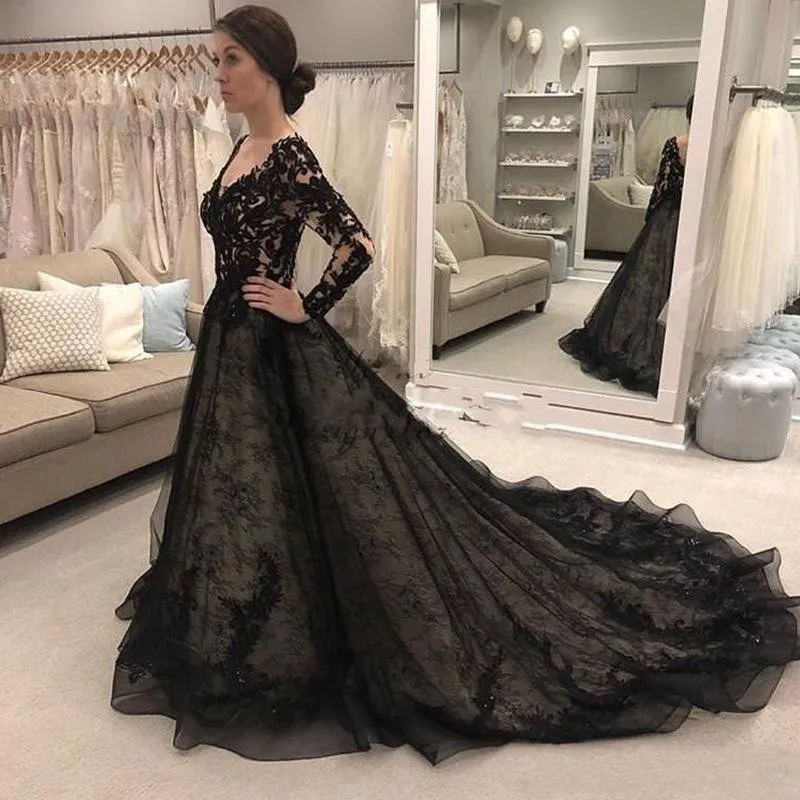Introduction: Unveiling the Mystique
In a world where tradition often dictates white as the color of choice for wedding dresses, the allure of the black wedding gown stands as a captivating symbol of elegance and sophistication. While unconventional to some, the tradition of wearing black on one’s wedding day dates back centuries, steeped in cultural significance and timeless allure. As modern brides seek to infuse their nuptials with personal style and unique flair, the resurgence of the black wedding dress tradition offers a nod to the past while embracing the future with grace and poise.
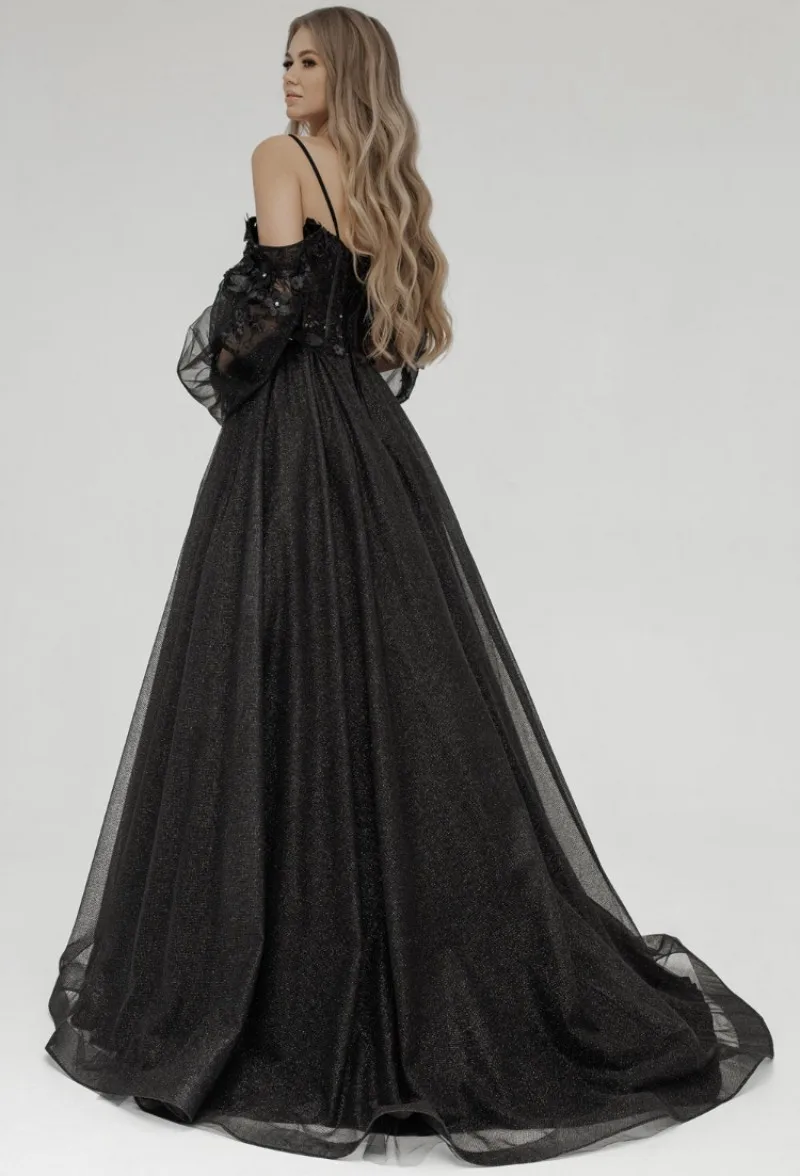
Origins of Tradition: A Historical Perspective
Ancient Roots: Symbolism and Significance
The tradition of wearing black for weddings traces its roots back to ancient cultures, where the color held profound symbolism and significance. In civilizations such as ancient Rome and Egypt, black was associated with fertility, prosperity, and protection against malevolent forces. Brides adorned in black garments were believed to invoke blessings from deities and ancestors, ensuring a prosperous union and safeguarding against misfortune. The use of black in wedding attire symbolized a connection to the divine and a reverence for the sacred bond of marriage, setting the stage for centuries of tradition to come.
Medieval Influence: Mourning and Matrimony
During the medieval period, the tradition of wearing black for weddings gained further prominence, albeit for different reasons. In European societies, black was often associated with mourning and solemnity, with brides donning dark attire to honor deceased loved ones or signify the seriousness of the marital commitment. However, black also represented a sense of regal elegance and sophistication, particularly among noble families and royalty. Black wedding dresses became a symbol of prestige and refinement, worn to exude an air of aristocratic grace and poise on the grandest of occasions.
Victorian Era: Queen Victoria’s Influence
The Victorian era marked a pivotal moment in the evolution of wedding traditions, with Queen Victoria’s iconic choice of a white wedding gown in 1840 setting a new standard of bridal fashion. However, amidst the prevailing trend of white, black wedding dresses continued to hold sway among certain circles, particularly among those of Gothic or bohemian inclinations. For some brides, black symbolized individuality and rebellion against societal norms, while for others, it represented a timeless elegance that transcended fleeting trends. Regardless of the prevailing fashion, the tradition of black wedding dresses persisted, weaving its way into the tapestry of bridal customs with an understated allure.
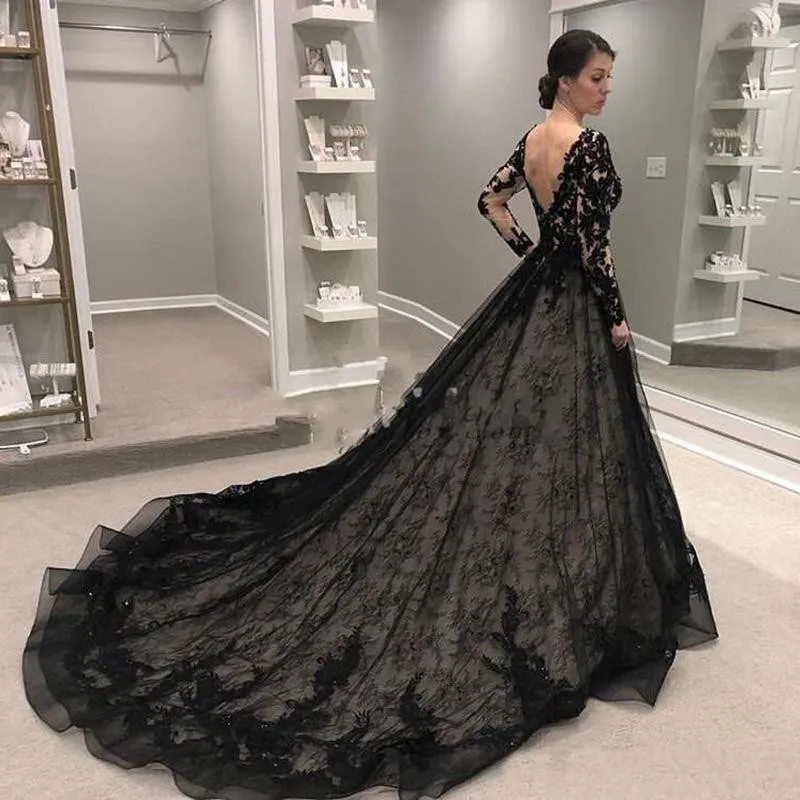
Revival of Tradition: Modern Interpretations
Contemporary Expression: Personal Style and Artistic Freedom
In the modern era, brides are embracing the tradition of black wedding dresses with renewed enthusiasm, viewing them as an expression of personal style and artistic freedom. With weddings becoming increasingly personalized and non-traditional, many brides are eschewing conventional norms in favor of attire that reflects their unique personalities and preferences. For some, a black wedding dress serves as a bold statement of individuality and empowerment, while for others, it represents a timeless elegance that transcends fleeting trends. Whatever the motivation, the resurgence of black wedding dresses underscores a shift towards inclusivity and acceptance of diverse expressions of love and commitment.
Cultural Influence: Global Perspectives on Bridal Attire
The tradition of wearing black for weddings transcends geographical boundaries, with cultures around the world embracing dark hues in their bridal attire for various reasons. In Asian cultures such as China and Vietnam, black is traditionally associated with prosperity and good fortune, making it a popular choice for wedding ceremonies and celebrations. Similarly, in African and Middle Eastern cultures, black wedding dresses symbolize dignity, strength, and resilience, reflecting the rich tapestry of cultural traditions and beliefs. As globalization continues to blur the lines between cultural boundaries, brides are drawing inspiration from diverse sources, incorporating elements of black wedding dress tradition into their own ceremonies with reverence and respect.
Fashion Forward: Designers Pushing Boundaries
The fashion industry has played a pivotal role in redefining the perception of black wedding dresses, with designers pushing boundaries and challenging conventions to create innovative and avant-garde bridal attire. From haute couture runways to boutique ateliers, black wedding dresses are making a statement as symbols of elegance, sophistication, and modernity. Designers are experimenting with luxurious fabrics, intricate embellishments, and unconventional silhouettes to craft black wedding dresses that are as unique as the brides who wear them. Whether it’s a sleek and minimalist gown or a dramatic and opulent creation, black wedding dresses are capturing the imagination of brides-to-be seeking to make a bold and unforgettable statement on their special day.
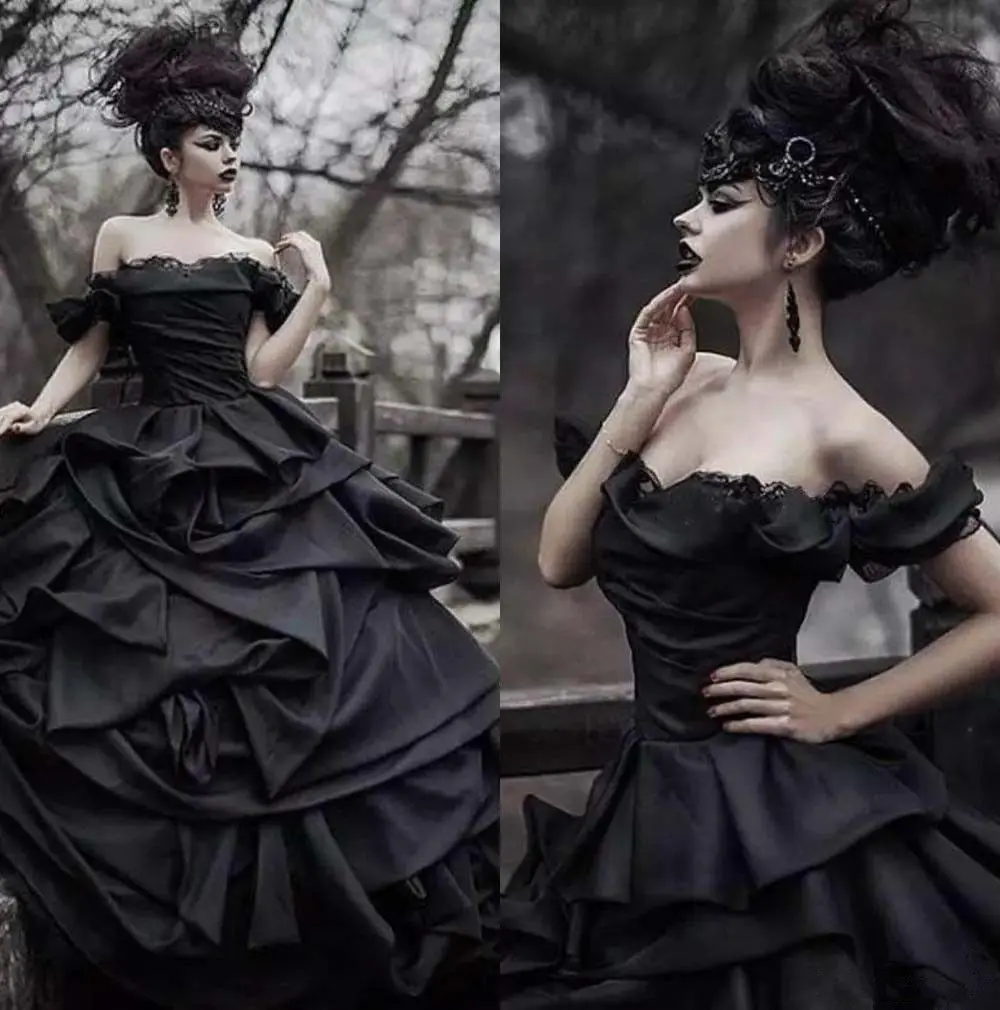
Symbolism and Significance: The Meaning Behind the Black Wedding Dress
Elegance and Sophistication: A Timeless Appeal
At its core, the black wedding dress exudes an aura of elegance and sophistication that transcends time and trends. Unlike its white counterpart, which is often associated with purity and innocence, black embodies a sense of mystery, allure, and refinement. Brides who choose to wear black on their wedding day are making a statement about their individuality and confidence, embracing their inner strength and resilience as they embark on a new chapter of life. The black wedding dress symbolizes a departure from convention and a celebration of personal style, allowing brides to express themselves authentically and fearlessly.
Reverence and Remembrance: Honoring the Past
For some brides, the decision to wear black for their wedding carries deeper significance, serving as a tribute to loved ones who have passed away or a reflection of personal experiences and struggles. Black wedding dresses evoke a sense of reverence and remembrance, honoring the memories of those who are no longer with us while celebrating the resilience and strength of the human spirit. Each stitch and seam of the black wedding dress tells a story, weaving together the threads of the past with the promise of the future, creating a tapestry of love, loss, and legacy that is both profound and poignant.
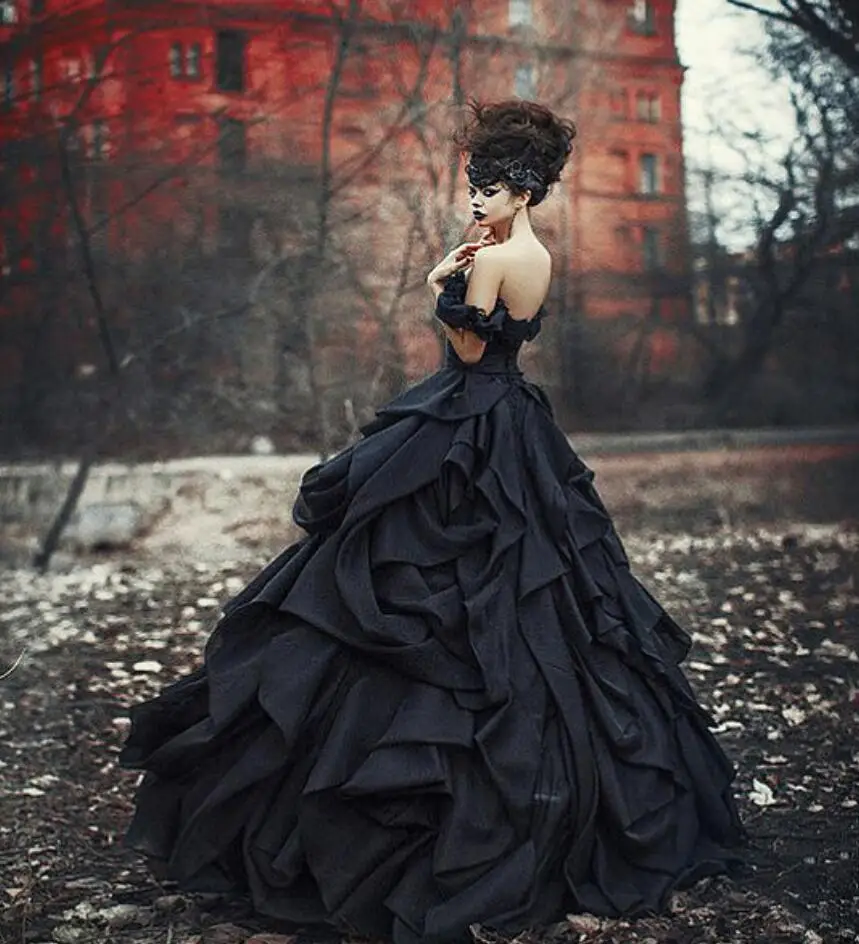
Empowerment and Individuality: Breaking Boundaries
In a world where conformity often reigns supreme, the black wedding dress represents a bold act of defiance against societal norms and expectations. Brides who choose to wear black on their wedding day are embracing their individuality and asserting their autonomy, refusing to be confined by outdated conventions or narrow definitions of beauty. The black wedding dress empowers brides to embrace their true selves and celebrate their uniqueness with pride and confidence. It is a symbol of liberation and self-expression, reminding us that love knows no bounds and that beauty comes in all shapes, sizes, and shades.
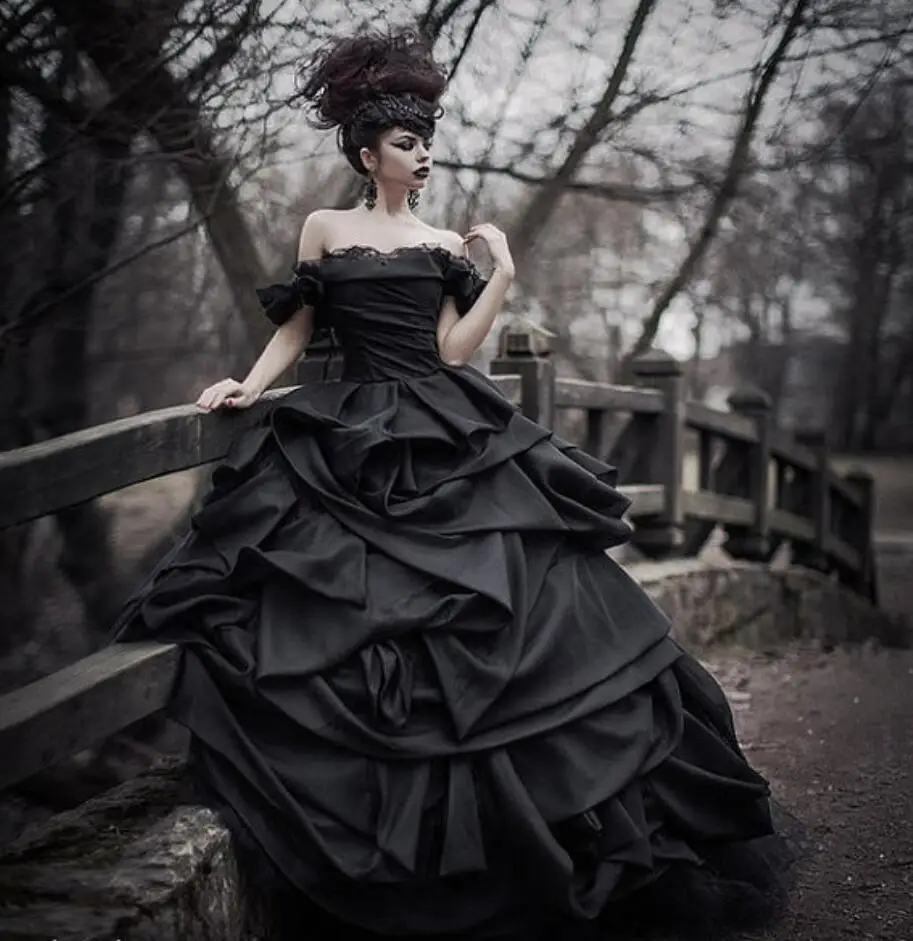
Conclusion: A Timeless Tradition Reimagined
In conclusion, the black wedding dress tradition continues to captivate the imagination and inspire brides around the world with its timeless allure and enduring significance. From ancient civilizations to modern-day celebrations, black wedding dresses have stood as symbols of elegance, sophistication, and individuality, transcending cultural boundaries and societal norms. As brides seek to infuse their nuptials with personal style and meaning, the resurgence of black wedding dresses offers a nod to tradition while embracing the future with grace and poise. Whether worn as a symbol of empowerment, remembrance, or simply personal preference, the black wedding dress remains a testament to love, resilience, and the beauty of breaking boundaries.
Tags: Classic Elegance Dress